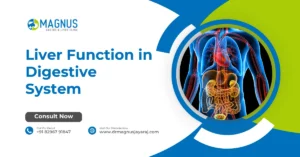Probiotics for liver health are a powerful tool in maintaining overall wellness. As Dr. Magnus Jayaraj explains, the liver plays a vital role in filtering toxins, regulating metabolism, and producing essential proteins. But what happens when your liver faces challenges like fatty liver disease, cirrhosis, or inflammation? Probiotics, the “good bacteria,” can help restore balance and improve liver function. Let’s explore how probiotics for liver health can make a difference and address some common concerns about their use.
The Importance of Liver Health and the Role of Probiotics
The liver is an incredibly hardworking organ. It detoxifies the body, processes nutrients, and fights off infections. But poor diet, sedentary lifestyles, and certain medical conditions can impair its function. Probiotics for liver health work by improving gut health, which directly impacts liver function through the gut-liver axis.
- Enhanced Detoxification: Probiotics help maintain a healthy gut lining, preventing harmful substances from reaching the liver.
- Reduced Inflammation: Probiotics can reduce systemic inflammation, which often leads to liver damage.
- Improved Metabolism: Certain probiotic strains assist in breaking down fats, reducing fat accumulation in the liver.
Dr. Magnus Jayaraj emphasizes that probiotics for liver health are not a cure-all but a valuable part of a broader wellness strategy.
Can Probiotics Cause Liver Damage?
One common question is whether probiotics cause liver damage. Dr. Magnus Jayaraj addresses this misconception with clarity.
- The Reality: High-quality probiotics are safe for most individuals and support liver health.
- Potential Risks: Problems may arise from low-quality products or incorrect dosages, but these are rare.
- Professional Guidance: Consulting a healthcare provider ensures you’re choosing the best probiotics for liver health tailored to your needs.
Probiotics cause liver damage only when used irresponsibly or in rare cases of severe underlying conditions. Always seek professional advice, Dr. Magnus Jayaraj advises.
Is Probiotics Good for Liver Cirrhosis? Understanding the Connection
Liver cirrhosis, a condition marked by scarring of the liver, can lead to serious complications. Dr. Magnus Jayaraj explains that probiotics are a promising adjunct in managing this condition.
- Ammonia Reduction: Probiotics help reduce ammonia levels in the body, alleviating symptoms like confusion and fatigue.
- Improved Gut Barrier: Probiotics strengthen the gut lining, preventing harmful toxins from reaching the liver.
- Reduced Inflammation: By balancing gut bacteria, probiotics can lower inflammation, a key factor in cirrhosis progression.
So, is probiotics good for liver cirrhosis? Dr. Magnus Jayaraj confidently says yes, as part of a comprehensive treatment plan.
The Best Probiotics for Liver Health According to Dr. Magnus Jayaraj
Not all probiotics are created equal. For liver health, certain strains stand out. Dr. Magnus Jayaraj recommends these as the best probiotics for liver health:
- Lactobacillus rhamnosus: Known for reducing fat buildup in the liver and improving overall gut health.
- Bifidobacterium longum: Proven to reduce liver inflammation and improve enzyme levels.
- Multi-Strain Probiotics: A combination of strains often provides comprehensive benefits for liver health.
Choosing the best probiotics for liver involves looking for clinically proven strains and products with a high CFU (colony-forming unit) count.
Probiotics for Nonalcoholic Fatty Liver Disease (NAFLD)
Nonalcoholic fatty liver disease (NAFLD) is a growing concern worldwide. Dr. Magnus jayaraj highlights the role of probiotics for liver health in managing NAFLD.
- Fat Reduction: Probiotics regulate lipid metabolism, reducing fat accumulation in the liver.
- Improved Enzymes: Regular probiotic use can normalize liver enzyme levels, a marker of liver health.
- Inflammation Control: Probiotics help curb inflammation, a major factor in NAFLD progression.
Probiotics for liver health are an excellent addition to lifestyle changes like a balanced diet and regular exercise.
How Do Probiotics Affect Fatty Liver Disease?
Probiotics work at multiple levels to combat fatty liver disease, a condition often linked to poor diet and sedentary habits.
- Balancing Gut Bacteria: Probiotics restore the gut microbiome, reducing the release of harmful substances that affect the liver.
- Improved Fat Metabolism: They assist in breaking down fats, lowering the risk of liver fat accumulation.
- Reduced Markers of Damage: Studies show probiotics can decrease liver damage markers in patients with fatty liver.
Dr. Magnus Jayaraj stresses the importance of consistency when using probiotics for liver health to see significant results.
Which Probiotic Is Best for Fatty Liver?
If you’re dealing with fatty liver, you may wonder which probiotic is best. Dr. Magnus Jayaraj suggests focusing on these key strains:
- Lactobacillus acidophilus: Excellent for reducing liver inflammation.
- Bifidobacterium bifidum: Known for improving gut and liver enzyme balance.
- Probiotic Blends: Products combining multiple strains provide a more comprehensive approach to liver health.
The best probiotics for liver are often those supported by scientific research and tailored to individual health needs.
Symptoms of Fatty Liver Disease and Risk Factors
Recognizing fatty liver disease early is key to effective management. Dr. Magnus Jayaraj outlines the common symptoms and risk factors.
- Symptoms: Fatigue, discomfort in the upper abdomen, and unexplained weight gain are common.
- Risk Factors: Obesity, types of liver transplant, and high cholesterol significantly increase the likelihood of developing fatty liver.
- When to Act: If you notice these signs, consider consulting a healthcare provider about probiotics for liver health.
Probiotics and Other Liver Disorders
While probiotics are beneficial for fatty liver and cirrhosis, Dr. Magnus Jayaraj notes their potential in other liver conditions.
- Liver Inflammation: Probiotics can help reduce inflammation caused by conditions like hepatitis.
- Liver Regeneration: Certain probiotic strains support liver regeneration and repair.
- Toxin Reduction: Probiotics aid in detoxifying harmful substances that could worsen liver damage.
Incorporating probiotics for liver health into your routine can provide support for overall liver function.
Probiotic Strains Beneficial for Liver Health
- Lactobacillus and Bifidobacterium strains play a central role in maintaining liver health by restoring microbial balance in the gut. These strains reduce intestinal permeability, preventing toxins such as lipopolysaccharides from entering the bloodstream and reaching the liver. By lowering inflammation and oxidative stress, they indirectly ease the liver’s workload and support its natural detoxification functions. They are widely studied and recommended as some of the best probiotics for liver support.
- Saccharomyces boulardii is unique because it acts as a probiotic yeast rather than a bacterial strain. It helps suppress the growth of harmful pathogens in the gut while reducing the generation of inflammatory metabolites. By lowering oxidative stress, this strain improves liver resilience and reduces the risk of progression from fatty liver to more advanced disease. For individuals with liver complications, it offers protective and restorative effects.
- Clostridium butyricum is another beneficial strain known for producing butyrate, a short-chain fatty acid crucial for intestinal barrier integrity. A healthy gut lining ensures that harmful substances do not cross into circulation and burden the liver. Strengthening this barrier enhances liver detoxification, lowers cellular damage, and supports long-term liver health. Its protective properties make it valuable in liver disease prevention.
Choosing the Right Probiotic Supplements
- When choosing probiotics for liver detox, it is essential to focus on supplements containing multiple clinically proven strains. Multi-strain products are more effective because they target different aspects of gut health, from reducing inflammation to improving digestion and nutrient absorption. They provide a more comprehensive approach to supporting liver function compared to single-strain options.
- The best probiotics for liver should always come with documented scientific evidence. Strains like Lactobacillus rhamnosus, Bifidobacterium longum, and Saccharomyces boulardii are particularly effective in reducing liver enzyme levels and protecting against fatty liver progression. Quality supplements will clearly state the strain name and colony-forming unit (CFU) count to ensure adequate potency.
- Another key consideration is delivery technology. Probiotics must survive stomach acid to reach the intestines alive and active. Advanced capsules with delayed-release mechanisms or spore-forming strains provide better results. These ensure consistent benefits for both liver detox and long-term liver repair.
Probiotics For Fatty Liver – The Evidence
- Scientific research strongly supports the role of probiotics in managing fatty liver disease. The best probiotics for fatty liver, such as Lactobacillus and Bifidobacterium, improve lipid metabolism and reduce triglyceride accumulation within liver cells. This prevents the progression of non-alcoholic fatty liver disease (NAFLD) and enhances overall liver function. Clinical findings suggest that probiotics significantly lower liver fat content and improve liver enzyme profiles.
- Probiotics for liver detox are also effective in lowering oxidative stress and systemic inflammation, both of which play a role in liver disease progression. Studies show that patients with fatty liver who took probiotic supplements had reduced levels of alanine transaminase (ALT) and aspartate transaminase (AST), which are key markers of liver injury. This demonstrates a measurable improvement in liver health.
- For individuals with advanced disease, the best probiotics for liver cirrhosis have shown benefits in reducing complications. They help restore gut balance, minimize toxin production, and lower inflammation that drives fibrosis. This makes probiotics a supportive therapy not just for fatty liver but also for chronic liver conditions, offering a natural complement to medical management.
Conclusion
Probiotics for liver health are a natural, effective way to support and improve liver function. From managing fatty liver disease to reducing inflammation in liver cirrhosis, probiotics offer a range of benefits. Dr. Magnus Jayaraj has shared valuable insights on choosing the best probiotics for liver, addressing common concerns, and making probiotics part of your wellness journey.




